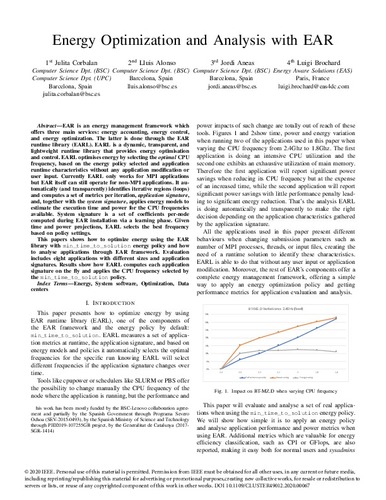Mostra el registre d'ítem simple
Energy optimization and analysis with EAR
| dc.contributor.author | Corbalán González, Julita |
| dc.contributor.author | Alonso Jane, Lluís |
| dc.contributor.author | Aneas Gómez, Jordi |
| dc.contributor.author | Brochard, Luigi |
| dc.contributor.other | Universitat Politècnica de Catalunya. Departament d'Arquitectura de Computadors |
| dc.contributor.other | Barcelona Supercomputing Center |
| dc.date.accessioned | 2021-02-10T11:42:49Z |
| dc.date.available | 2021-02-10T11:42:49Z |
| dc.date.issued | 2020 |
| dc.identifier.citation | Corbalán, J. [et al.]. Energy optimization and analysis with EAR. A: IEEE International Conference on Cluster Computing. "2020 IEEE International Conference on Cluster Computing: 14–17 September 2020, Kobe, Japan: proceedings". Institute of Electrical and Electronics Engineers (IEEE), 2020, p. 464-472. ISBN 978-1-7281-6677-3. DOI 10.1109/CLUSTER49012.2020.00067. |
| dc.identifier.isbn | 978-1-7281-6677-3 |
| dc.identifier.uri | http://hdl.handle.net/2117/338290 |
| dc.description.abstract | EAR is an energy management framework which offers three main services: energy accounting, energy control, and energy optimization. The latter is done through the EAR runtime library (EARL). EARL is a dynamic, transparent, and lightweight runtime library that provides energy optimisation and control. EARL optimises energy by selecting the optimal CPU frequency, based on the energy policy selected and application runtime characteristics without any application modification or user input. Currently EARL only works for MPI applications but EAR itself can still operate for non-MPI applications. It automatically (and transparently) identifies iterative regions (loops) and computes a set of metrics per iteration, application signature, and, together with the system signature, applies energy models to estimate the execution time and power for the CPU frequencies available. System signature is a set of coefficients per-node computed during EAR installation via a learning phase. Given time and power projections, EARL selects the best frequency based on policy settings. This papers shows how to optimize energy using the EAR library with min_time_to_solution energy policy and how to analyse applications through EAR framework. Evaluation includes eight applications with different sizes and application signatures. Results show how EARL computes each application signature on the fly and applies the CPU frequency selected by the min_time_to_solution policy. |
| dc.description.sponsorship | This work has been mostly funded by the BSC-Lenovo collaboration agreement and partially by the Spanish Government through Programa Severo Ochoa (SEV-2015-0493), by the Spanish Ministry of Science and Technology through PID2019-107255GB project, by the Generalitat de Catalunya (2017- SGR-1414) |
| dc.format.extent | 9 p. |
| dc.language.iso | eng |
| dc.publisher | Institute of Electrical and Electronics Engineers (IEEE) |
| dc.subject | Àrees temàtiques de la UPC::Informàtica::Arquitectura de computadors |
| dc.subject.lcsh | Data processing service centers -- Energy consumption |
| dc.subject.other | Energy |
| dc.subject.other | System software |
| dc.subject.other | Optimization |
| dc.subject.other | Data centers |
| dc.title | Energy optimization and analysis with EAR |
| dc.type | Conference report |
| dc.subject.lemac | Centres informàtics -- Consum d'energia |
| dc.contributor.group | Universitat Politècnica de Catalunya. CAP - Grup de Computació d'Altes Prestacions |
| dc.identifier.doi | 10.1109/CLUSTER49012.2020.00067 |
| dc.description.peerreviewed | Peer Reviewed |
| dc.relation.publisherversion | https://ieeexplore.ieee.org/document/9229570 |
| dc.rights.access | Open Access |
| local.identifier.drac | 30363775 |
| dc.description.version | Postprint (author's final draft) |
| dc.relation.projectid | info:eu-repo/grantAgreement/AGAUR/2017 SGR 1414 |
| dc.relation.projectid | info:eu-repo/grantAgreement/AEI/Plan Estatal de Investigación Científica y Técnica y de Innovación 2017-2020/PID2019-107255GB-C22/ES/UPC-COMPUTACION DE ALTAS PRESTACIONES VIII/ |
| local.citation.author | Corbalán, J.; Alonso, L.; Aneas, J.; Brochard, L. |
| local.citation.contributor | IEEE International Conference on Cluster Computing |
| local.citation.publicationName | 2020 IEEE International Conference on Cluster Computing: 14–17 September 2020, Kobe, Japan: proceedings |
| local.citation.startingPage | 464 |
| local.citation.endingPage | 472 |


